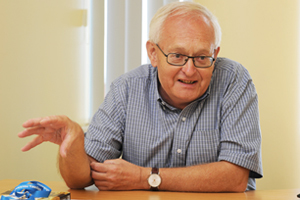Elections veteran back for 20th anniversary of freedom
17 March 2014
Cape Town at the height of summer; a country celebrating the 20th anniversary of its democracy; and an historic general election in May. Jørgen Elklit couldn't have timed it better.
The professor of political science at the University of Aarhus is back in the country, and newly appointed to the Van Zyl Slabbert Visiting Chair in Politics and Sociology at UCT.
The chair is underpinned by a five-year grant from the Open Society Foundation for South Africa. It honours former opposition leader and Institute for Democracy in Africa founder Dr Frederick van Zyl Slabbert's commitment to an open and democratic society.
A specialist in electoral systems and voting behaviour, Elklit has advised and consulted in more than 20 countries, including Bosnia-Herzegovina, Afghanistan, China (village elections), Lesotho, Kenya (as secretary to the Independent Review Commission in 2008), and Zimbabwe.
Africa offers the scholar a wealth of case studies.
Elklit's first link to South Africa dates to his appointment to a panel under the Goldstone Commission, which looked into how one could best prepare for the 1994 general election.
And as one of the international members of the Independent Electoral Commission (IEC) in 1994, he found himself in the middle of the country's political rebirth.
"It was one of the best elections," he reminisces.
Elklit and Van Zyl Slabbert met on a number of occasions and served together on the board of the Electoral Institute for Southern Africa in the mid-1990s. He remembers Van Zyl Slabbert as a knowledgeable and dedicated champion of democracy.
They also worked together on the Electoral Task Team, headed by Van Zyl Slabbert, which advised Cabinet on electoral system options for the 2004 and subsequent elections, and where Elklit was the only non-South African in the team.
Now settled in the Department of Political Studies, his academic base for the first half of 2014, Elklit is delighted to be back in South Africa. Among other things, he'll contribute to the department's research and staff and student seminars until the end of his assigned term.
This month he jets off to Washington to receive the International Foundation for Electoral Systems' Joe C Baxter Award for his contribution over the years to the development of democracy and election integrity.
Although he has followed the country's progress since that watershed 1994 election, Elklit is still keen to understand the political zeitgeist. On his desk is Max du Preez's A Rumour of Spring, which examines the country's progress post-1994, and Roger Southall* and John Daniel's Zunami!, which dissects the 2009 general elections and Jacob Zuma's rise to power.
"It's a fantastic opportunity to see how things have developed in the electoral field."
He has no doubt that the run-up to the milestone May election will be smooth.
"Running an election should be boring and uneventful: voters are registered; ballots are cast; votes counted; seats allocated.... There shouldn't be anything too complex about it. Politics should be discussed somewhere else and not focus on electoral administrative issues."
1994 was a case in point. Once the legwork had been done, things proceeded to plan, bar the telephonic complaints streaming into the IEC operational centre in Johannesburg that ballot papers and marking ink had run out at some rural polling stations - or had not been delivered.
"We thought it was a disaster," Elklit says. But when they saw the TV news at the close of day, they were thrilled to see joyful voters, many in those isolated communities, who like millions of others, had cast their ballots for the first time.
"Then it all changed; we knew we had achieved something special."
It was short-lived. Not long after, they were alerted that a hacker had accessed the main computer and changed some of the parties' results - this as the country celebrated the dizzying success and prepared to install Nelson Mandela.
Keeping the news under wraps, the team recounted the data to ensure the results were clean, delays that prompted public ridicule - and a Zapiro cartoon disparaging the IEC's counting abilities.
"We didn't want to talk about it until we were sure it wouldn't have political consequences," recalls Elklit.
He'll be watching the May elections carefully; research for a paper he plans to submit for a conference in Montreal in July.
And while 1994 was the Rainbow Nation's miracle election, not everything has panned out in the way he thought.
"There have been some surprises and disappointments," says Elklit.
"In May 1994 many observers thought Parliament, elected as representative of the people, would have a stronger voice in terms of what happens in the country. But this hasn't been the case."
He also believes party funding needs scrutiny, to safeguard fairness between the political behemoths and the shrimps. "There should be a formula to ensure balance."
He's also dismayed by what looks like political intolerance and lack of respect for a basic human right - freedom of choice - among South Africa's electorate.
Twenty more years may be needed for real democracy to root, he adds.
"I hope I live long enough to see it."
*Professor Roger Southall was the first Van Zyl Slabbert Chair.
Story by Helen Swingler. Picture by Michael Hammond.
 This work is licensed under a Creative Commons Attribution-NoDerivatives 4.0 International License.
This work is licensed under a Creative Commons Attribution-NoDerivatives 4.0 International License.
Please view the republishing articles page for more information.










